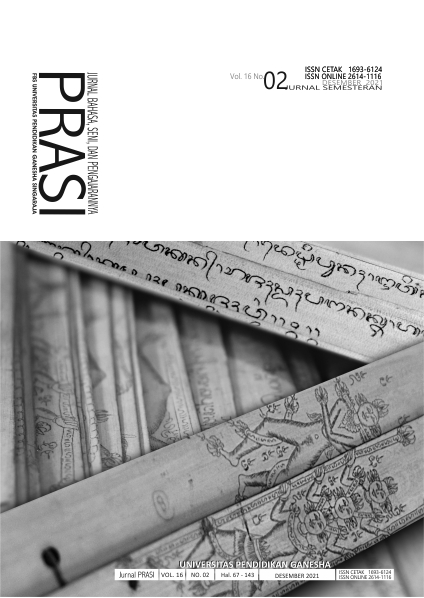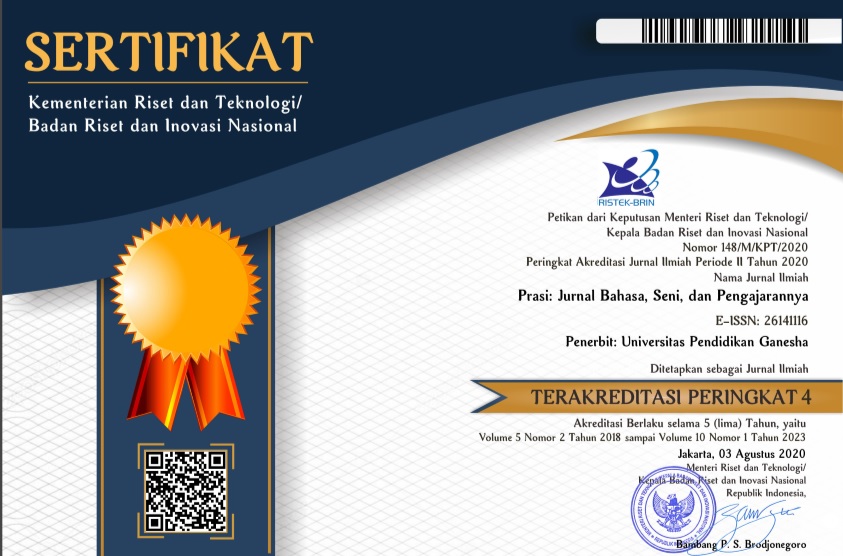KESANTUNAN BERBAHASA JOKO WIDODO DALAM TALK SHOW MATA NAJWA
DOI:
https://doi.org/10.23887/prasi.v16i02.40615Keywords:
language politeness, Joko Widodo, Mata Najwa Talk ShowAbstract
ABSTRAK
Tujuan penelitian ini adalah untuk mengetahui bentuk pematuhan dan pelanggaran maksim kesantunan berbahasa Joko Widodo dalam memberi tanggapannya terkait pandemi Covid-19 sehingga melalui penelitian ini dapat terlihat bagaimana perilaku kebahasaan Joko Widodo dalam menjalin komunikasi. Sumber data diperoleh dari media sosial Youtube. Penelitian ini menggunakan pendekatan prinsip kesopanan dari Leech. Data dikumpulkan dengan mentranskrip video Talk Show Mata Najwa episode Jokowi diuji pandemi yang diunggah di laman media sosial Youtube Najwa Shihab, peneliti kemudian menyimak dan mengklasifikasi data berdasarkan pematuhan prinsip kesantunan dan bentuk-bentuk pelanggaran prinsip kesantunan. Hasil penelitian menunjukkan bahwa Joko Widodo dalam menjalin komunikasi di program Talk Show Mata Najwa lebih dominan mematuhi prinsip kesantunan berbahasa. Sebanyak 70% tuturan Jokowi mengandung pematuhan prinsip kesantunan dan 30% tuturan Jokowi mengandung pelanggaran prinsip kesantunan. Dengan demikian, perilaku berbahasa Joko Widodo saat diundang di program Talk Show Mata Najwa telah menunjukkan perilaku berbahasa yang santun. Mengingat Joko Widodo yang bertindak sebagai kepala negara, secara implisit telah memberikan contoh kepada masyarakat dalam hal berperilaku santun saat menjalin sebuah komunikasi.
Kata kunci: kesantunan berbahasa, Joko Widodo, Talk Show Mata Najwa
ABSTRACT
The purpose of the study is to find out the politeness and violations of politeness maxims in Joko Widodo's language in responding to the COVID-19 pandemic so that through this research it can be seen how Joko Widodo's language is in establishing communication. The data source is obtained from the social media Youtube. This research used Leech's politeness principle approach. Data was collected by transcribing the video Talk Show Mata Najwa episode Jokowi tested for pandemic which was uploaded on social media page Youtube Najwa Shihab's, the researcher then listened and classified the data based on compliance with politeness principles and forms of violation of politeness principles. that the results show that Joko Widodo in establishing communication in the Mata Najwa Talk Show program is more dominant in obeying the principles of language politeness. It is known that 70% of Jokowi's speeches contain compliance with politeness principles and 30% of Jokowi's speeches contain violations of politeness principles. Thus, Joko Widodo's language behavior when invited to the Mata Najwa Talk Show program has shown polite language behavior. Considering that Joko Widodo, who acts as head of state, has implicitly set an example for the community in terms of behaving politely when establishing communication.
References
Dewi, Tertia Lusiana. (2016). “Karakteristik Program Berita Televisi pada Talk Show Mata Najwa Metro TV”. Skripsi. Surakarta: Institut Seni Indonesia.
Grundy, Peter. (2000). Doing Pragmatics. London: Arnold.
Holmes, Janet. (1992). An Introduction to Sociolinguistics. London: Longman.
Kusno, A., & Rahman, A. (2016). Bentuk-bentuk Pelanggaran Prinsip Kesopanan dalam Ceramah Keagamaan. Lingua: Jurnal Ilmu Bahasa dan Sastra, 11(2), 103–115. https://doi.org/10.18860/ling.v11i2.3502
Leech, Geoffrey. (1983). The Principles of Pragmatics. New York: Longman Group Limited.
Mansor, N. S., Mamat, R., Omar, R. C., & Ghazali, A. H. A. (2014). Ketidaksantunan Bahasa sebagai Strategi Pujukan dalam Iklan Berbahasa Spanyol. Gema Online Journal of Language Studies, 14(3), 207–223. DOI:10.17576/GEMA-2014-1403-13
Noor, K. U., & Prayitno, H. J. (2016). Pergeseran Kesantunan Positif Siswa Kelas IX MTsN 1 Surakarta Berlatar Belakang Budaya Jawa. Kajian Linguistik dan Sastra, 1(1), 17–24. DOI:10.23917/kls.v1i1.2474
Rahardi, Kunjana, dkk. (2016). Pragmatik: Fenomena Ketidaksantunan Berbahasa. Yogyakarta: Erlangga.
Sudaryanto. (2015). Metode dan Aneka Teknik Analisis Bahasa. Yogyakarta: Sanata Dharma University Press.
Ulum, D. E. L., & Kusmanto, H. (2018). Disfemia pada Komentar Akun Instagram Mimi Peri. Seminar Kajian Bahasa, Sastra, dan Pengajarannya V (pp. 232– 237).
Wardaugh, Ronald. (1988). An Introduction to Sociolinguistics. New York: Basil Blackwell.
Watts, Richard J. (2003). Politeness. Cambridge: Cambridge University Press.
Wijana, I Dewa Putu. (1996). Dasar-dasar Pragmatik. Yogyakarta: Penerbit Andi.
Wijana, I Dewa Putu. (2021). Dasar-dasar Pragmatik (Edisi Revisi). Yogyakarta: TS Publisher.
Downloads
Published
Issue
Section
License
Authors who publish with Prasi agree to the following terms:- Authors retain copyright and grant the journal the right of first publication with the work simultaneously licensed under a Creative Commons Attribution License (CC BY-SA 4.0) that allows others to share the work with an acknowledgment of the work's authorship and initial publication in this journal
- Authors are able to enter into separate, additional contractual arrangements for the non-exclusive distribution of the journal's published version of the work (e.g., post it to an institutional repository or publish it in a book), with an acknowledgment of its initial publication in this journal.
- Authors are permitted and encouraged to post their work online (e.g., in institutional repositories or on their website) prior to and during the submission process, as it can lead to productive exchanges, as well as earlier and greater citation of published work. (See The Effect of Open Access)


.png)
.png)









